Why do girls get periods every month? What are the sanitary products available and how does one use them? Does it make the girl unclean or impure? What are the hygiene measures one should follow? This guide is an attempt to answer many such questions surrounding periods that not only girls/women get but boys/men too may get.
WHAT IS MENSTRUATION?
(Also known as periods/ monthly/ menses/ मासिक धर्म/ ऋतु/माहवारी) (slang: chumms/ aunt flow)
From Wikipedia:
Menstruation, also known as a period or monthly, is the regular discharge of blood and mucosal tissue (known as menses) from the inner lining of the uterus through the vagina. The first period usually begins between twelve and fifteen years of age, a point in time known as menarche. However, periods may occasionally start as young as eight years old and still be considered normal.
The typical length of time between the first day of one period and the first day of the next is 21 to 45 days in young women, and 21 to 31 days in adults (an average of 28 days). Bleeding usually lasts around 2 to 7 days. Menstruation stops occurring after menopause, which usually occurs between 45 and 55 years of age.
Up to 80% of women report having some symptoms prior to menstruation. Common signs and symptoms include acne, tender breasts, bloating, feeling tired, irritability, and mood changes. These may interfere with normal life, therefore qualifying as premenstrual syndrome, in 20 to 30% of women. In 3 to 8%, symptoms are severe.
As a menstruating girl, if you do not get your periods, you are either pregnant or, are suffering from an infection/disease. Do note that pregnancy depends on your ovulation period.
WHAT HYGIENE PRODUCTS ARE AVAILABLE?
There are many products available in India, including in rural areas. Some of these are described below:
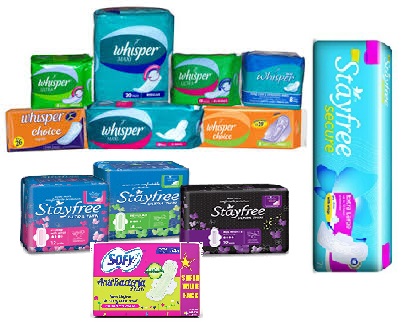
Some popular brands
Sanitary pads/ napkins: These are the most common products available in the market — all chemists store these. Most pads have glue on one side (sticky strip) that sticks to the underwear and can be worn easily. Some reusable pads are held in place with snaps or the elastic in the underwear. Pads come in different sizes — regular, medium or heavy flow (often called maxi pads).
There are several brands available in the market — at the nearest pharmacy store. Commonly available brands (in
rural India) include Whisper, Stayfree and Sofy.
Note: Remember to change your pad especially the gel-based ones within four hours of heavy use, otherwise you can develop an infection. Maintaining good hygiene is most important.
Here is a guide to help you learn how to change a sanitary pad: https://www.wikihow.com/Change-a-Sanitary-Pad
Using pads can give you painful rashes. Disposal can be an issue and it is also bad for the environment.
Tampons: These may not be available in villages, but are available in smaller towns. This is one product that most sportswomen swear by (yes, including me) as there is no fear staining. Tampons worn with a pad as a safety precaution gives you the freedom from worrying about your periods.
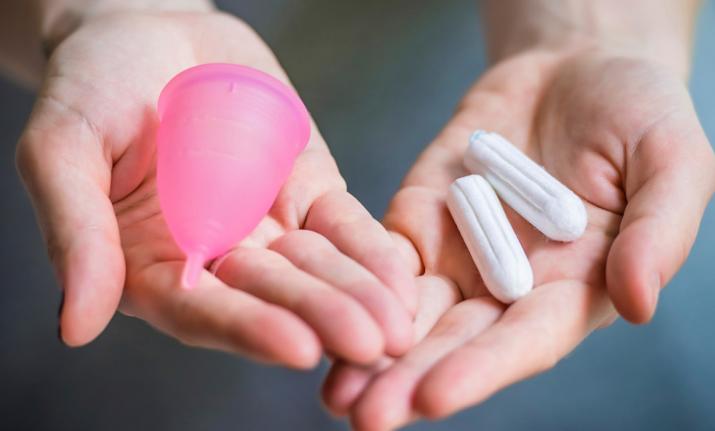
Tampon and Menstrual Cup: Pic by IndiaTV
It is a small ‘plug’ of soft material (usually rayon or a blend of rayon and cotton) inserted into the vagina to absorb menstrual blood. Using tampons with smooth, rounded applicators may make it easier. However, in India, tampons usually come without applicators. Johnson & Johnson’s O.B. is a popular tampon that comes in regular and heavy sizes. In metropolitan cities, imported tampons with applicators are available.
Using a tampon for the first time can be confusing Here is a guide on how to use a tampon: https://www.wikihow.com/Use-a-Tampon
Note: Tampons have an 8-hour limit. Wearing it for longer can cause irritation and encourage the growth of Staph bacteria that causes Toxic Shock Syndrome (TSS), a life-threatening condition.
Some tampons are available abroad but can be ordered online in India.
Cloth pads/reusable pads: These are like disposable pads, but are reusable. These pads are expensive upfront; however, on a long-term basis, they save you money. Surprisingly, most of these are being made and sold by NGOs. Some known brands are Eco-Femme, FeelFree and Saukhyam Pads.
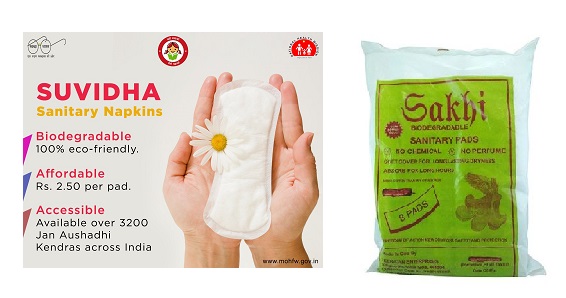
Organic Pads made in India
Some NGOs sell organic pads. However, the reach/availability is limited. Many organisations are still trying to develop more eco-friendly and pocket-friendly pads.
Note: Recycling pads by handwashing them could be a psychological issue for some girls/women. Moreover, these pads need to be dried out in the sun to remove bacteria. Most rural women may be too shy to hang them out to dry (why don’t they dry pads the way they would dry bras?). Most blogs and pad companies suggest machine-washing these reusable pads.
Menstrual cups: These are small, flexible, funnel-shaped cups made of rubber or silicone. Menstrual cups are inserted into the vagina to collect period fluid. Cups can hold more blood than other methods, leading many women to use them as an eco-friendly alternative to tampons. Depending on the flow, these cups can be worn for up to 12 hours.
These products are available in different sizes and colours — refer to the size guide of the individual brand. SheCup and DivaCup are two popular brands.
Here is a guide to help you learn how to use a menstrual cup: https://www.wikihow.com/Use-a-Menstrual-Cup
Note: It takes some practice to use these products. It can also seem a bit discomfiting to drain the cup before reinserting. Sterilizing it after a period cycle may pose a psychological issue: how can one use a kitchen utensil to boil the cup?
A friend suggests that menstrual cups could be the preferable option in India as most Indians use water for sanitation anyway, and water is also easily available in most toilets.
If you are worried about your virginity and the fear of breaking your hymen while using tampons/menstrual cups, read this: https://www.organicup.com/blog/hymen-virginity-menstrual-cup/
Some menstrual cups are available abroad but can be ordered online in India.
Period panties: These are the new age wonders! These panties can replace pads and tampons. A few brands offer panties with a kangaroo pocket in the front to place a heating pad to help with menstrual cramps!
Organic period panties are now being made in India by Gramalaya, an NGO, which makes Feel Free cloth pads. Other brands include Vv SkiVvys, DearKate (special patented material).
If they become cheaper and easily available, they could revolutionize the entire industry.
Tampliner: It is a tampon attached to a soft mini-liner that tucks between the labia to provide an extra layer of security without the need for a separate pad. It is, in essence, a compact pad and tampon combined.
Since it is made of organic biodegradable cotton, it is environment friendly. However, user reviews suggest that these are uncomfortable to insert and pose problems while passing urine.
Flex menstrual disc: Marketed as the ultimate tampon substitute, it was designed to operate like menstrual cups, with the added option of allowing sex.
In my opinion, it is too early to dismiss tampons and disposable sanitary pads until alternative products become comfortable to use, are pocket friendly, and eco-friendly.
MANAGING MENSTRUAL CRAMPS
Many girls (women) complain of menstrual cramps. Some school girls experience extreme pain that makes them skip school/work.
These cramps occur due to contractions in the uterus/womb. Over the counter medicine includes: Aspirin or Ibuprofen (please seek your doctor’s advice before taking any medication).
Use a heating pad or rubber hot water bags/bottles. You can make your own heating pad by heating/ microwaving a bag or sock of fennel/rice/salt.
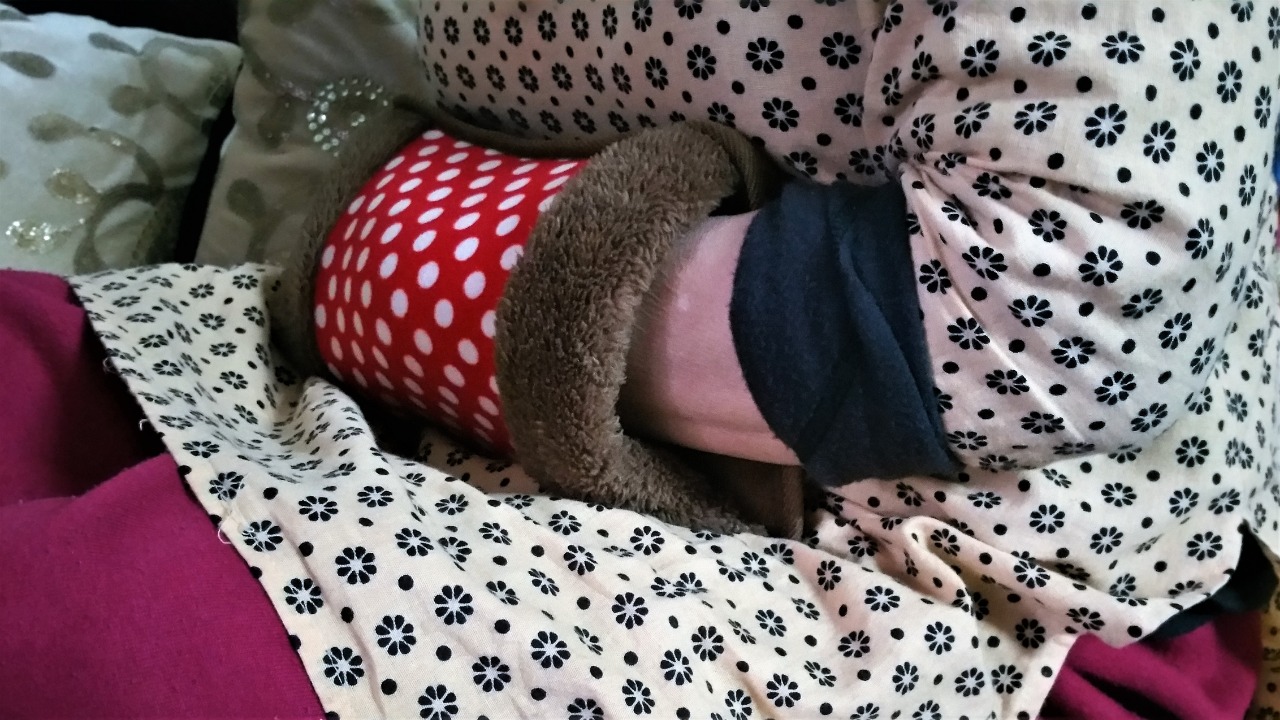
Use a hot bag to relieve pain
You should also:
- Massage your abdomen.
- Avoid foods that contain caffeine and salt.
- Avoid consumption of tobacco and alcohol.
- Drink hot water with ginger.
Every household in India has its own homemade recipe — there is no harm in trying.
Some traditional practices followed by a menstruating girl/ woman that continues even today
- Do not touch lemon or achar (pickle) or plants.
- Do not go to the puja room/ altar (Devta ko thaan/Kul-ghar).
- Do not enter the kitchen.
- Do not go out with or touch boys/men.
- Do not wash your hair or take a bath.
- Some societies require a menstruating girl to live in a room outside the house. These girls/women cook their own food for fear of angering their deities (Devta).
These rules often lead to questions like:
Is it a crime to have periods? What has she done wrong? Is she really that unclean/ impure? Why can’t she enter the temple? Why can’t she cook? Why can’t she touch lemons, plants, achar or even people? Why can’t she play outside?
Let us look for answers for the traditional practices in ancient Vedic science: Ayurveda and Yoga — the knowledge house of India.
Note: In classical Vedic scheme, Ayurveda is the Vedic system developed specifically for healing purposes. There is no other Vedic system of healing apart from Ayurveda. Yoga is the Vedic system of spiritual practice or sadhana. All Vedic sadhana or spiritual practice involves some form of Yoga practice.
Most Ayurveda is based on the tri–doshas (three bio-energies) that govern the functions of the human body: Vata (governs all movement in the mind and body), Pitta (governs all heat, metabolism and transformation in the mind and body) and Kapha (governs all structure and lubrication in the mind and body).
Most Ayurveda is based on the tri–doshas (three bio-energies) that govern the functions of the human body: Vata (governs all movement in the mind and body), Pitta (governs all heat, metabolism and transformation in the mind and body) and Kapha (governs all structure and lubrication in the mind and body).
Yoga sees the human body as a transformer of energy, of prana: a whirl of energy in the universal prana-ic ocean. Through their exploration of the body and breath, the ancient yogis discovered that prana (life force energy) could be further subdivided into energetic components they called Vata/Vayus (winds). Prana vayu, Apana vayu, Vyana vayu, Udana vayu and Samana vayu.
Both the words Vāta (atmosphere) and Vāyu (air) have almost identical meanings in Sanskrit or Vedic traditions, and are therefore used interchangeably.
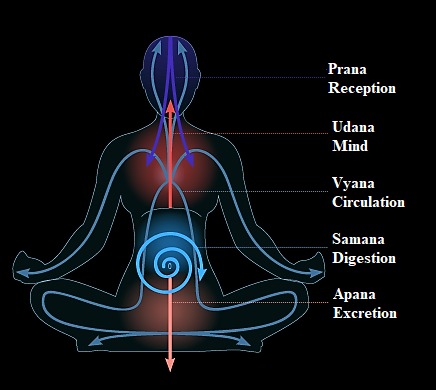
The Five Vatas
Apana is all about release — physical, mental, and emotional release. It is responsible for the downward movement of materials out of the body, including excretory processes including periods. The balanced function of Apana vata is important so that we are able to release negative energy, destructive thoughts, and physical toxins.
Most of us will agree that all spiritual activity is aimed at uplifting our energy upwards (Chi to some). Forcing this downward flowing Apana Vayu upwards can result in physical pain and cause imbalance. This is why menstruating women are told to abstain from all spaces where such energies are centered (temples/ prayer assembly) or created (as in certain Yoga position/ exercise).
Contrary to popular belief, in ancient India menstruating women were considered to be pure —embodiment of living goddesses. They are said to have an energy of their own and menstrual blood considered powerful. Therefore, certain societies forbade any contact with them during their periods. There is even a temple dedicated to the Bleeding Goddess: The Kamakhya temple in Guwahati, Assam.
Every year in Asaar (June), the Brahmaputra river near Kamakhya turns red. It is believed that the goddess is menstruating.
If you are intrigued by all this – you can read further on this blog:
Unearthing menstrual wisdom – Why we don’t go to the temple, and other practices
Modern science also talks of women becoming physically weak during menstruation. Have you seen exercise blogs/ videos asking menstruating woman to abstain from doing certain strenuous exercises?
AS A MAN, WHAT CAN YOU DO?
There is nothing wrong with periods, Supriya. Everyone — every female— has them.
“I know, you fool’, Supriya screamed, quiet sniffles punctuating her speech. ‘I know everyone has them. But you could have at least come into my room to talk. You could have said what you just said. You could have laughed about it. You could have made it normal. There I was, thinking it was the end of the world, and you…you didn’t care at all. You didn’t even pop your head in to the room to say hello. And all along I thought you’d tell me Mua (mother) is a fool, and we’d go up to the terrace and laugh about it all. When even you treated me like I was an animal — no, worse than that — I really thought I had done something wrong. I hated myself. I hated you. I hated life. I’d get those pains in my stomach, not knowing where they came from. I’d feel woozy one minute and get cramps the next. I hate you.’
— A father’s journey from the book ‘A Gurkha’s Daughter’ by Prajwal Parajuly
I don’t think I could have explained better than the above lines.
Imagine a situation like this: All the kids are on an outing. Suddenly the boys notice red stains on Kamala’s frock. Everyone starts making fun of her. Ashamed, humiliated and frightened, Kamala picks up her bag and runs away.
- It is not a crime to have periods! Do not treat a menstruating girl as an outcast or avoid her. Treat her as you normally
- During periods especially during the initial year, girls are still coming to terms with the changes in their bodies. The thought of having to deal with periods every month of your life can seem like a daunting task. It takes a long time for the reality to sink in and accept the truth.
- People often make fun of the period pain. All girls suffer from period pain but for some girls it can be so severe that they need medical help. It doesn’t help with the mood swings either. Period pain and mood swings are real!
- Men and women need to talk about periods and sensitize the boys in the family.
As a woman, some measures you can take to have maintain hygiene and have a ‘happy’ period:
- Firstly, you need to understand that it is OK to have periods. If you DO NOT assert yourself, no one else will.
- Maintain good hygiene. Read the instructions that comes with your product and follow them. For e.g., if you use disposable pads, change your pad every few hours, or when it is soaked with blood. Most pads with gel should be changed every four hours as the gel traps bacteria that cause infection.
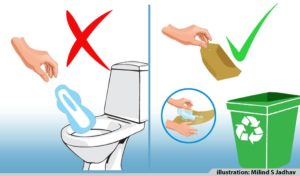
Pic by Menstrupedia.com
- Wrap used pads in the wrapper or toilet paper and throw them in the trash. Flushing used pads or wrappers will clog toilets. Your tampon has disposal instructions on the box.
- While travelling or using public toilets, my biggest woe is seeing soiled pads left outside and not even rolled up! Yuck! Please have the decency to leave the toilet clean.
- Period dates can sometimes change due to several factors. You should always be prepared with your pads and wrappers. You can even use old newspapers to wrap soiled pads. Please dispose used pads in a trash can, if there is one.
Remember that disposable sanitary pads are not bio-degradable. Try to switch to more environment-friendly options.
For more information on puberty, menstruation, hygiene, etc., please go through this friendly guide: https://www.menstrupedia.com/
Any talk of periods will be incomplete without a mention of the real “Padman of India”, Dr. Arunachalam Muruganantham. He was instrumental in bringing menstruation to mainstream conversation. His story was featured in a Hindi movie starring Akshay Kumar.
In July 2018, the government of India announced GST (tax) exemption on sanitary pads.
- I hope that someday we can have more comfortable, pocket-friendly and environment-friendly products that are easily available to all girls/women no matter where they live. Period.
- wrappers will clog toilets. Your tampon has disposal instructions on the box.
- While travelling or using public toilets, my biggest woe is seeing soiled pads left outside and not even rolled up! Yuck! Please have the decency to leave the toilet clean.
- Period dates can sometimes change due to several factors. You should always be prepared with your pads and wrappers.
- You can even use old newspapers to wrap soiled pads.
- Please dispose used pads in a trash can, if there is one.
PS: Some people believe that discrimination against women exists only in Hinduism. However, most of the religions and tribal practices have also done the same. More details about other cultures in the major religions of the world can be found here.
Coming home, in his book ‘A grammar of Limbu’, author George van Driem has mentioned untouchability due to menstruation:
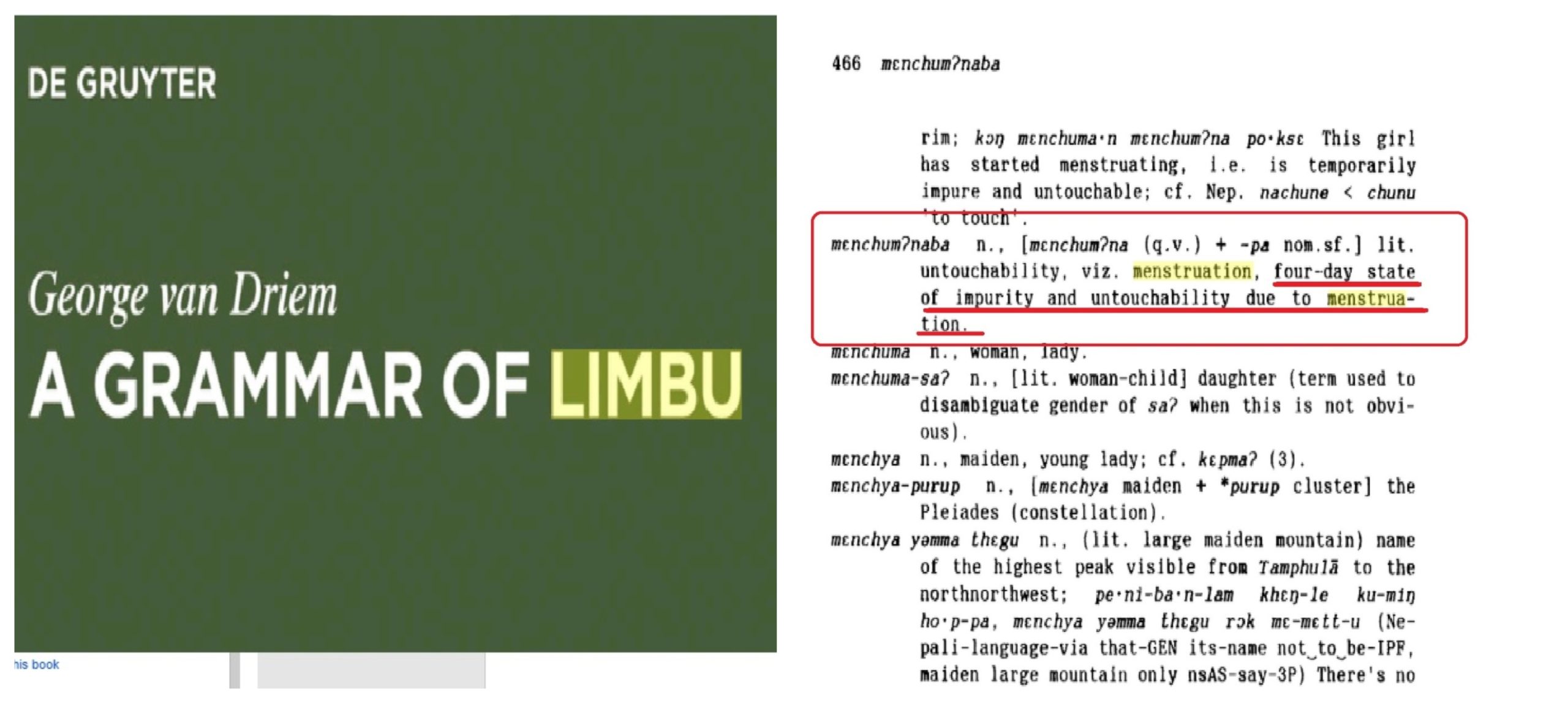
Writes: Roshni Pradhan, she can be reached at: proshni@gmail.com


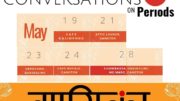

Leave a comment